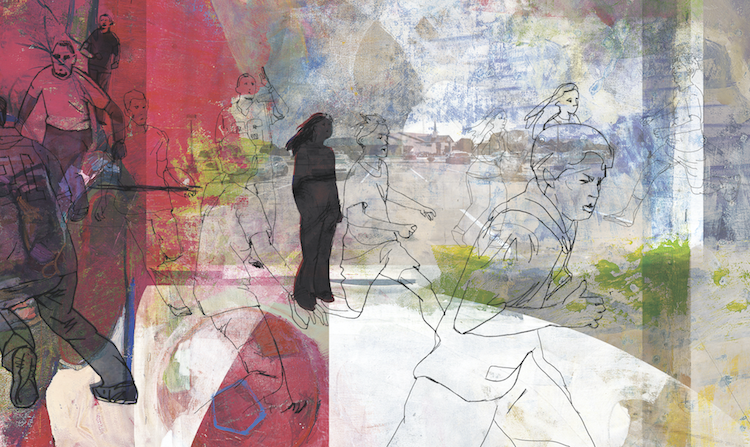
Life in the city can be full of joy and opportunity. Yet it can also offer increased exposure to poverty, tragedy, and loss. As an African American woman born and raised in the city, much of my interest in urban ministry comes from my experiences as a native of Detroit. As a doctoral student in clinical psychology, I have been privileged to focus some of my research on work among urban youth ministry workers in the Los Angeles metro area as part of a research project completed by Associate Professor of Psychology Cynthia Eriksson and the Headington Program Research Lab at Fuller, in partnership with the Fuller Youth Institute and funded by the Tyndale House Foundation. Specifically, my research has focused on understanding how urban youth ministry workers relate with God after they have experienced a traumatic event or severe life stressor. The results of this study have been eye opening, and they have implications for urban youth ministry workers, partners, and urban young people themselves.
In 2011, I was part of a research team that set out to study how major life crises impacted urban youth ministry workers’ relationships with God. Our team interviewed men and women who had been involved in ministry for an average of 10 years. These participants self-identified as black, white, Latino, and multiracial. The project explored two primary questions: (1) How do incredibly difficult experiences impact one’s relation- ship with God when one is involved in urban ministry? and (2) What racial/ethnic group differences exist?
The project’s findings were revealing. We discovered that our research participants related with God in a variety of ways following their crisis experiences. During our interviews, all of the subjects talked about times in which relating to God felt very difficult after their crisis, and different ways that these experiences impacted them. Some of the most difficult experiences with God that urban workers described included feeling “distant” from God, “angry” toward God, and “confused” about why God allowed the situation to happen. Some of the most positive spiritual experiences included feeling “intimately connected” with God, maintaining “trust” in God in spite of the hardship, being “prayerful,” and finding hope as they remembered that the call to ministry was a part of “joining” God in what he is doing here on earth.
One of the most interesting discoveries was that, in general, even when urban youth leaders noted that they felt angry, distant, confused, or experienced tension with God, they reflected a sense of openness to maintaining engagement with God in the midst of all of their uncertainty and frustration. In other words, during the interview, these participants felt comfortable reporting significant difficulty in their relationship with God but also expressed a willingness to remain engaged with God in the midst of the situation.
However, this wasn’t true for everyone. It is important to note that some participants also indicated that their experiences of anger following their crisis were so distressing that they felt unable to remain engaged with God or with certain spiritual disciplines (e.g., praying or attending church) for a period of time. Although only a small percentage of urban youth leaders indicated experiencing such deep feelings of disconnection with God and/or the Christian community around them, it is noteworthy that sometimes experiences of crisis are so intense that experiencing distance from God—or other believers—seems inevitable. Although some study participants felt unable to engage with God and/or Christian community for a time, they did eventually reengage. In fact, these same participants also spoke of experiencing a sense of openness to God and closeness with God during the interview.
Finally, we explored differences in how participants reported experiencing God and/ or Christian community based on racial or ethnic group differences. In other words, we wanted to know if African American, Caucasian, or Latino participants were more or less likely to talk about their difficult experiences in a particular way during the interview. We found that there were, in fact, differences in reporting. While representatives of each ethnic group indicated experiencing all of the positive experiences with God, we noted that African American leaders did not explicitly indicate experiencing several of the negative emotions expressed by their Latino and Caucasian colleagues.
Please note that just because African American youth leaders didn’t seem to explicitly indicate feelings of “anger” or “confusion” in their relationship with God during the interview, it doesn’t mean that they did not experience those feelings. It does mean that they did not talk about these experiences in their interviews in the same ways as others.
“As a police chaplain, I respond to critical incident calls as diverse as infant deaths, teen suicides, and traffic accidents. It is difficult to find the right words to say when you’re sitting in a room of young people grieving the loss of their friend to suicide. Words may fail us in the midst of tragedy. Often our most helpful response is to be present with others, sitting with them in their grief and being a safe place for them to express their feelings. This sacred ministry of God’s presence reminds us that we are not alone in the pain. Rituals help us to move between loss, memory, and healing. Together we can find a new normal and hope.”
+ Mary Glenn, an adjunct faculty member with the Fuller Youth Institute and School of Intercultural Studies, has been a pastor for over 20 years, a law enforcement chaplain and trainer, and an educator committed to leader and community development.
So what does all of this mean for doing life and ministry with youth in urban communities? Here are several key takeaways:
Debriefing with those you know and trust is essential. Research tells us that some people do not feel very comfortable sharing with others about deep experiences of disconnection or distress in their relationship with God because they don’t know if others believe that this type of expression is acceptable. Previous research reveals these differences can be correlated with racial and ethnic background.1 Perhaps one of the reasons that African Americans in our study did not talk about certain experiences during the interview is because they did not feel safe enough to do so. Highlighting the experience of emotional safety is incredibly important for ministry—especially in culturally diverse ministry settings. Intentionally creating space for honesty and openness in community is key. If students or staff feel they cannot be completely honest with at least one person in their support network, they won’t be able to experience the beauty of having others “bear their burdens with them” (Gal 6:2).
We must normalize questioning, doubting, and lamenting in the journey of faith. Sometimes we mistakenly believe that real “faith” isn’t messy, difficult, or at times overwhelming. But it is. Genuine faith is vulnerable and hard. All of the urban youth leaders in this study are men and women who were faithful to God in ministry, but who deeply struggled with fears and deep questions even in the midst of their journey. The Psalms are full of examples of open discussion of distress with God (e.g., Psalm 44, 60, 74, 79, 80, 85, or 90). These passages contain honest questions and deep expressions of longing, frustration, fear, and even anger directed toward God. Sometimes students, staff members, or ministry volunteers are unaware that expressing these feelings is not only acceptable, but also healthy—especially after experiencing a crisis or trauma. We don’t usually stay in these places of prolonged distress, but we do experience them.
People process differently. This may be an obvious statement to many, but sometimes we forget this simple truth. We also forget that people process differently due to individual differences (like personality), and other times due to cultural differences (such as ethnic or denominational/theological differences). These differences in processing are beautiful, and a normal part of most faith journeys. But sometimes people or organizations don’t make these differences seem acceptable. Ministry leaders should seek feedback from staff and students about what types of emotions or processes seem safe in their ministry community and what feels unsafe (e.g., expressing “sadness” but not “anger”). Once you’ve discovered what doesn’t feel safe to share, brainstorm together about how you can work together to create a safe space.
Ministry leaders model emotional expression. The impact of modeling can’t be overemphasized. Students and staff learn by watching and listening to what we say and do as well as what we don’t say and do. This study highlights that even exemplary ministry leaders feel distant, discouraged, and angry with God at times. How they talk about their experience often depends on what they have learned is acceptable to discuss or express nonverbally (e.g., crying). Emotional and spiritual health go hand in hand. When people experience a very stressful life event and know that expressing lament in one’s relationship with God and faith community is acceptable, they can remain open to faith rather than experience prolonged distance from their faith or their emotions (or both).
This research is a wonderful reminder that remaining faithful to Jesus and to his call to serve in urban environments can be incredibly painful. Jesus knew that faithfulness to the call would be painful and that safety in the midst of the difficulty is essential. In fact, Jesus prayed this prayer on our behalf: “I’m not asking that you take them out of this world but that you keep them safe from the evil one” (John 17:15). The community of faith is an essential part of the safety net that God has provided for us. My prayer as a Christ-follower and researcher is that we would learn to create safety for one another by acknowledging that ministry can be painful. Being honest about how that pain affects us and our relationships with God helps facilitate the process of hope and healing as we bear these burdens together.


